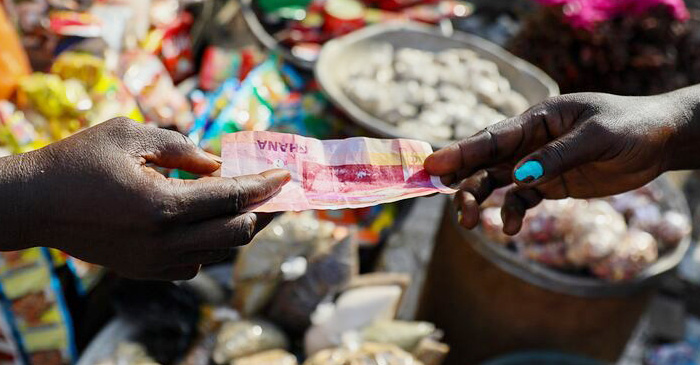
In Ghana today, a quiet suffering spreads across homes, markets, and workplaces. The prices of goods and services rise with frightening ease—triggered by the mere mention of fuel hikes or currency depreciation. Yet when conditions improve, when the cedi stabilises and fuel prices fall, the same traders and service providers who were swift to increase prices suddenly grow hesitant, even defiant. Why is it so easy to raise prices, but almost impossible to reduce them?
This is not just an economic issue—it is a deeply human one. It’s about the everyday hardship of ordinary Ghanaians who must navigate a system that feels increasingly rigged against them. Imagine a single mother waking before dawn, holding her last GHS20.00 as she boards a trotro with her child. She has heard the news that fuel prices have dropped. Hope stirs within her. Maybe transport fares will be lower today. But when she asks the driver, he casually waves her off and says, “We’re waiting for GPRTU to decide.” Her disappointment is not merely emotional—it is existential. That GHS20.00 must cover her transport fare, her child’s lunch, and dinner for the evening. There is no space for “wait-and-see” in her world. There is only the struggle to survive, one uncertain day at a time. But she is not alone, there are many others like her.
Many traders argue they cannot reduce prices because they purchased their stock at higher costs. Recently, the Ghana Union of Traders Association (GUTA) and the Association of Ghana Industries (AGI) appealed for a 60-day window to bring prices down, explaining that they need time to clear old inventory. While this argument carries some merit, it feels hollow to the ordinary consumer who watches prices shoot up within days of any fuel hike, without any grace period, consultation, or hesitation. When the situation benefits traders, action is swift. When it should benefit the consumer, the response is slow and reluctant. This one-sided urgency chips away at public trust and builds quiet frustration.
Our economy is showing signs of a deeper problem: everyone wants more. More profit, more margin, more income. But when it comes to giving back—by lowering prices or offering fair value—suddenly there is caution, hesitation, even silence. This is not only unsustainable; it is unfair. And the burden falls on those least equipped to carry it. The orange seller increases her price because she can’t afford a haircut anymore. The barber raises his charges because kenkey is more expensive. The kenkey seller hikes her price because tomatoes have gone up. Everyone is passing the burden to someone else, and the average Ghanaian, who has no power to adjust wages or control prices, ends up paying the price.
And yet, recent economic data tells a different story. Ghana’s inflation rate has dropped to 21.2% as of April 2025—the lowest it’s been in over a year. The cedi has stabilised, and global crude oil prices are trending downward. These indicators should, in theory, bring relief. But the market remains unmoved. Prices remain high. The economic burden remains heavy. Ghanaians continue to suffer, and hope remains just out of reach.
So we must ask ourselves a painful question: have we become so accustomed to hardship that we no longer recognise economic injustice when we see it? Are we, as a people, complicit in maintaining a broken system simply because we’ve gotten used to it?
The truth is, no one eats money. Whatever you earn is used to buy someone else’s goods or services. We are all connected in this fragile economic web. When one strand weakens, the entire system begins to unravel. If a teacher can’t afford rent, her morale drops. If a farmer can’t afford fertilizer, food prices rise. If customers stop coming to the kenkey seller, she raises her prices to survive. It’s a domino effect, spiraling endlessly—with no one to stop it.
This cycle doesn’t just threaten our economy—it threatens our sense of community. And it will only get worse unless we begin to act. Government and regulatory bodies must enforce price reductions when economic conditions improve. A fall in fuel prices should not be a headline alone; it should translate into real, visible reductions in transport fares and commodity prices. Price control guidelines must be more than paper—they must be implemented, tracked, and enforced with urgency.
But beyond government, citizens must also rise. We must strengthen consumer advocacy, raise our voices, and hold businesses accountable when they ignore favourable economic trends in the name of profit. Civil society and consumer protection agencies have a duty to ensure that fairness returns to our markets. Education and awareness are critical. Fair pricing is not a favour—it is a smart, sustainable business strategy. When prices fall reasonably, more people can buy, and trade continues. Greed may deliver short-term gain, but fairness builds long-term prosperity.
Ghana is blessed—with resilience, creativity, and a deep well of potential. But we cannot move forward if we normalise injustice in our economic life. If we want to thrive as a nation, we must begin by being fair to one another. If prices can rise easily, they must be able to fall just as easily when the time is right.
So, dear trader (or service provider), lower your prices when you can. Don’t wait for an association or a union to tell you what is fair. Look into the eyes of your customer and remember—they are just like you: trying to make it through another day.
The true strength of an economy is not measured only by inflation rates or GDP growth. It is measured by the dignity of its people, the honesty of its markets, and the compassion that flows through its transactions. Let us rise to do better—not because we are forced to, but because it is the right thing to do.
Written by Prince Kojo Asare (Head of News, Pent Media Centre)












